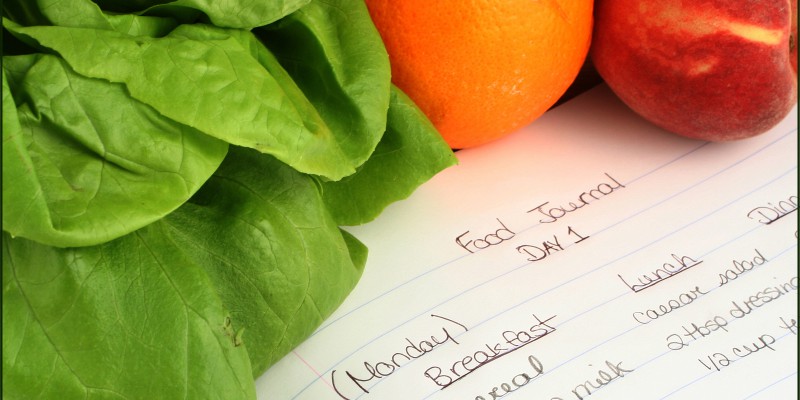A food journal is an excellent way to evaluate your diet. Where diet fads stand only to represent a dogma of dieting, a food journal brings you closer to truly understanding your own eating habits, and will empower you to make steady, progressive changes, that will lead you to a healthier life.
Lao Tzu once said “A journey of a thousand miles must begin with a single step.” If your journey includes improving your diet, it is a wise idea to take some time to discover where you stand, before you make your first move.
There are a multitude of diet plans, each of which make heroic claims as to the benefits that they will help you to achieve, and the miracles that they will accomplish. Whether your goals are weight loss, clean and healthy eating, or weight gain, a diet plan is only ever a couple of clicks away via the internet. With this huge availability, how are you ever supposed to know which supposed miracle diet path is the best for your needs?
Scrap The Diet Fad! Keep A Food Journal
It may be as simple as taking a look at dieting on a more personal level, and it may turn out that a food journal, a tool for increasing your awareness of your eating habits, could be a more effective solution than a specific diet fad.
Tracking your eating habits using a food journal, provides valuable information about your diet. It can show, not only the types of food you are eating, but can also reveal your eating habits; factors such as what times of the day you are prone to binge eating, how exercise affects your diet choices, or even how your mood and hormonal cycles can influence your food choices.

A journal allows you the chance to record information, and analyze it in a logical way. With a food journal, you can set aside your emotions and rationalizations, and focus your attention on finding the real issues in your current behaviors. Eating is highly affected by mood and emotions. It needs to be understood in a relevant context, and in a way that is personal to you. Only then will you overcome problems in your eating habits on a deeper, lasting level.
How To Keep A Food Journal
The information you gather in your journal will vary, depending on what you would like to know. Typically, a food journal includes an entry for each meal and snack, no matter how small. Other details often include the time of day, and also your mood, before and after eating, how much and what you drink (there are a lot of unhealthy drinks on the market too!), and even caffeine and alcohol intakes. Whatever factors you choose, honest daily notes should be kept.
The idea is to raise your awareness of your own eating habits, and your behaviors and feelings around those habits. With this personal knowledge, you will be well equipped to make healthy changes to your diet:
1. Find a journal that fits your life, or create one for yourself. Journals can be printed from the internet, recorded in a notebook, or kept in an app on a smartphone. Consider which format will be the easiest to fit into your life.
This link includes a couple of food diary templates that can be printed:
http://www.heathernicholds.com/planning/daily-food-diary-template
http://www.personal-nutrition-guide.com/food-diary-template.html
2. Record the amount you eat, as well as your mood, and any other factors that you choose. Do not worry too much about tracking calories. For now, the goal is to get a clear picture of how much you are eating, and the reasons why. This stage of the journey is about observation.
3. Keep a food journal for at least one whole week. You will begin to notice a pattern form, that relates to your daily activities and moods. The longer you journal, the clearer this pattern will become, and the more you will begin to develop a true understanding of your eating habits.
4. Review your food journal at the end of every week. Try not to read it every day. Simply record it, and review it later. The goal is to gather accurate information about your diet, for at least a little while, before actually making any changes. At the end of the week, take some time to reflect on your journal entries. Make note of any patterns you notice. It could be the amount of food you eat during work, how much chocolate you eat in the evenings, or that you always eat sweets during television time.
5. The patterns you have recorded are the key to understanding your own eating habits, and to making positive changes to your diet. You can take that personal, relevant diet information, and turn it into a positive plan of action, that tackles the root behavior around your eating habits. You will know what you eat that is bad, what affect it has on you, when and under what circumstances you over-indulge, and more. Now, take positive steps to make changes.
6. Work to make the changes that you have identified, and continue to record your habits using your food journal. Review at the end of the week, and see if you have managed to make a change for the better. Do this until you are completely happy with your habits.
A food journal may not give you instant weight loss like an extreme diet, or dieting pill, but it does give you sustainable healthy eating habits, which will last, and which are founded on real knowledge and effort. You will see positive changes in your life.
Have you used a food journal to track diet habits? What did you find helpful about the process? Have you had any experiences with certain diets, that you would like to recommend, or condemn?

